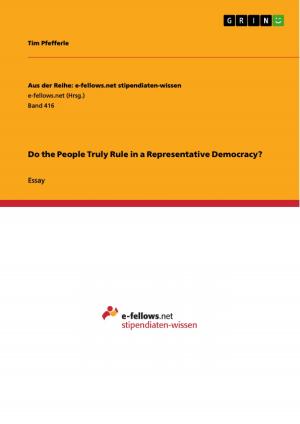Campaigning in America Today: The Role of Campaigns in U.S. Presidential Elections
Nonfiction, Entertainment, Drama, Anthologies| Author: | Ilka Kreimendahl | ISBN: | 9783638214278 |
| Publisher: | GRIN Publishing | Publication: | August 29, 2003 |
| Imprint: | GRIN Publishing | Language: | English |
| Author: | Ilka Kreimendahl |
| ISBN: | 9783638214278 |
| Publisher: | GRIN Publishing |
| Publication: | August 29, 2003 |
| Imprint: | GRIN Publishing |
| Language: | English |
Seminar paper from the year 2000 in the subject American Studies - Culture and Applied Geography, grade: 1 (A), University of Kassel (Anglistics), course: The Making of the President 2000, 11 entries in the bibliography, language: English, abstract: There is no aspect of contemporary American politics more criticized than the modern political campaign: it provides too little information for the voter, the amount of money spent is too high, there is no thoughtful discussion of issues, and campaign organizers will reach to the very edge of acceptable practices to find some way of appealing to the voters. These are some of the elements that are responsible for the growing disgust for election campaigns and the decline in political interest. However the question is if campaigns really do have consequences for the election outcome or if their effect is rather limited. This paper will focus on the development of political campaigns, their strategy and planning, as well as on issues and the presentation of the candidate. The composition will further have a look on the campaign and election in 1992, on the actual effects the campaign has on the voter and consequently on the election outcome. In the last two decades scholars perceived a change from old to new politics, including a significant modification in the nature of campaigns. In the last years the traditional partyoriented personal campaign has been largely replaced by the so-called candidate-centered, media-oriented campaign. The basic elements of campaigns changed dramatically because of increased nonvoting, the growth in the power of interest groups, and the power of the media. In national elections the expansion of the mass media campaign has led to a decline in the importance of party affiliation, while at the same time the party organizations themselves became more powerful.
Seminar paper from the year 2000 in the subject American Studies - Culture and Applied Geography, grade: 1 (A), University of Kassel (Anglistics), course: The Making of the President 2000, 11 entries in the bibliography, language: English, abstract: There is no aspect of contemporary American politics more criticized than the modern political campaign: it provides too little information for the voter, the amount of money spent is too high, there is no thoughtful discussion of issues, and campaign organizers will reach to the very edge of acceptable practices to find some way of appealing to the voters. These are some of the elements that are responsible for the growing disgust for election campaigns and the decline in political interest. However the question is if campaigns really do have consequences for the election outcome or if their effect is rather limited. This paper will focus on the development of political campaigns, their strategy and planning, as well as on issues and the presentation of the candidate. The composition will further have a look on the campaign and election in 1992, on the actual effects the campaign has on the voter and consequently on the election outcome. In the last two decades scholars perceived a change from old to new politics, including a significant modification in the nature of campaigns. In the last years the traditional partyoriented personal campaign has been largely replaced by the so-called candidate-centered, media-oriented campaign. The basic elements of campaigns changed dramatically because of increased nonvoting, the growth in the power of interest groups, and the power of the media. In national elections the expansion of the mass media campaign has led to a decline in the importance of party affiliation, while at the same time the party organizations themselves became more powerful.















